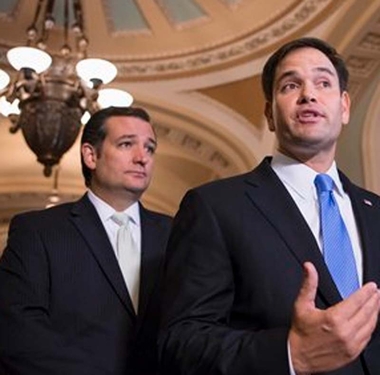GOP sets Senate push against health law, Planned Parenthood

Washington (AP) — Congressional Republicans hope a post-Thanksgiving drive to obliterate President Barack Obama's health care law and block Planned Parenthood's federal funds will spotlight their fierce support for top-tier conservative causes. The certain veto waiting at the White House will only help them sharpen their stance for voters, they say.
Yet even as GOP leaders express optimism that they'll push the bill through the Senate, the run-up to the debate reveals the tightrope they face to win the needed votes.
It also features the rare spectacle of prominent anti-abortion groups publicly pressuring two of their normally stalwart supporters who are battling for the Republican presidential nomination.
A look at the upcoming fight:
___
Voting Against Health Care Law And Planned Parenthood — Again
Since the health overhaul became law in 2010, lawmakers have had dozens of votes, mostly in the House, on GOP efforts to scuttle all or part of it. With Republicans controlling Congress this year, each chamber has voted to halt the $450 million in annual federal payments to Planned Parenthood, the party's reaction to the group's role providing fetal tissue for research.
Democrats mock the repeated votes as time-wasting political posturing. But Republicans say there's value in forcing Obama to veto legislation crippling the health law and stopping Planned Parenthood's federal dollars.
With the 2016 elections approaching, they say a veto would underscore that electing a Republican president and keeping GOP control of Congress would put both goals within reach.
Aggressively confronting Obama could also shield incumbent Republicans against the complaints of anti-establishment conservative voters who grumble that GOP lawmakers have been too submissive to the president.
"It's taking this a step further, pushing the ball down the field further than we've been able to do in the past," said Sen. John Thune, R-S.D., a member of Senate GOP leadership.
___
The Price Of Avoiding A Filibuster
Republicans have swathed the bill in a procedure that allows passage by a simple Senate majority, not the 60 votes ordinarily required to end Democratic stalling tactics.
With 54 GOP senators, that puts approval within reach. The House passed its version in October.
But there's a cost.
Using this procedure means the bill must reduce the budget deficit. Republicans can't annul the entire health law in one single-sentence stroke because the Congressional Budget Office, lawmakers' official nonpartisan referee, says repeal would increase deficits by $350 billion over a decade.
As a result, the House-passed legislation would repeal certain provisions of the health law to undermine it, including its requirement that individuals obtain coverage and employers offer it to workers or face fines.
Other parts of the law would remain intact, including some for which repeal would anger voters and jeopardize GOP incumbents' re-election prospects in competitive states like Ohio, Pennsylvania and Illinois. That includes the statute's expansion of Medicaid and its federal subsidies for lower-earning people buying health coverage.
This leaves Senate Republican leaders with a challenge.
___
Getting To 51
Senate leaders haven't finished crafting their legislation and will tailor it to attract votes. Senate Majority Leader Mitch McConnell, R-Ky., says it will include the health law repeal and a halt to Planned Parenthood's money.
But some GOP senators reluctant to bar Planned Parenthood's funds might vote "no." Moderate Sen. Susan Collins of Maine says she's "concerned" about that language, and Sens. Mark Kirk of Illinois, Kelly Ayotte of New Hampshire and Alaska's Lisa Murkowski — all facing re-election next year — might find the decision difficult.
On the other hand, three conservative Republicans said last month that the House measure "simply isn't good enough." Presidential hopefuls Sens. Ted Cruz of Texas and Marco Rubio of Florida, as well as Utah's Mike Lee, said they'd oppose the bill unless it "fully repeals Obamacare pursuant to Senate rules."
While that lawyerly language leaves some wiggle room, it's clear GOP leaders face a delicate task securing 51 votes.
___
Abortion Foes Weigh In
Powerful anti-abortion groups have begun openly pushing those conservative senators to back the legislation.
In a recent letter, National Right to Life warned senators they'd include votes on the bill in their annual rating of lawmakers, which influences many conservative voters.
"The pro-life vote is to pass the bill for the sake of defunding Planned Parenthood — no excuses," they wrote.
In an interview, Right to Life chief lobbyist Douglas Johnson said Rubio, Cruz and Lee all have lifetime ratings of 100 percent from the group. In what seemed an unspoken reference to the Cruz-Rubio rivalry for the GOP nomination, Johnson said a lawmaker opposing the bill would lose that perfect score "and would thereby be distinguished from other senators" who score 100 percent.
Marjorie Dannenfelser, president of the anti-abortion Susan B. Anthony List, wrote that Rubio's and Cruz's votes would be "a test of their leadership" showing how as president either would "immediately take a sledge hammer" to the health law and Planned Parenthood.
By Alan Fram, Associated Press. Copyright 2015 The Associated Press. All rights reserved. This material may not be published, broadcast, rewritten or redistributed.
The Gayly – November 24, 2015 @ 3:25 p.m.





